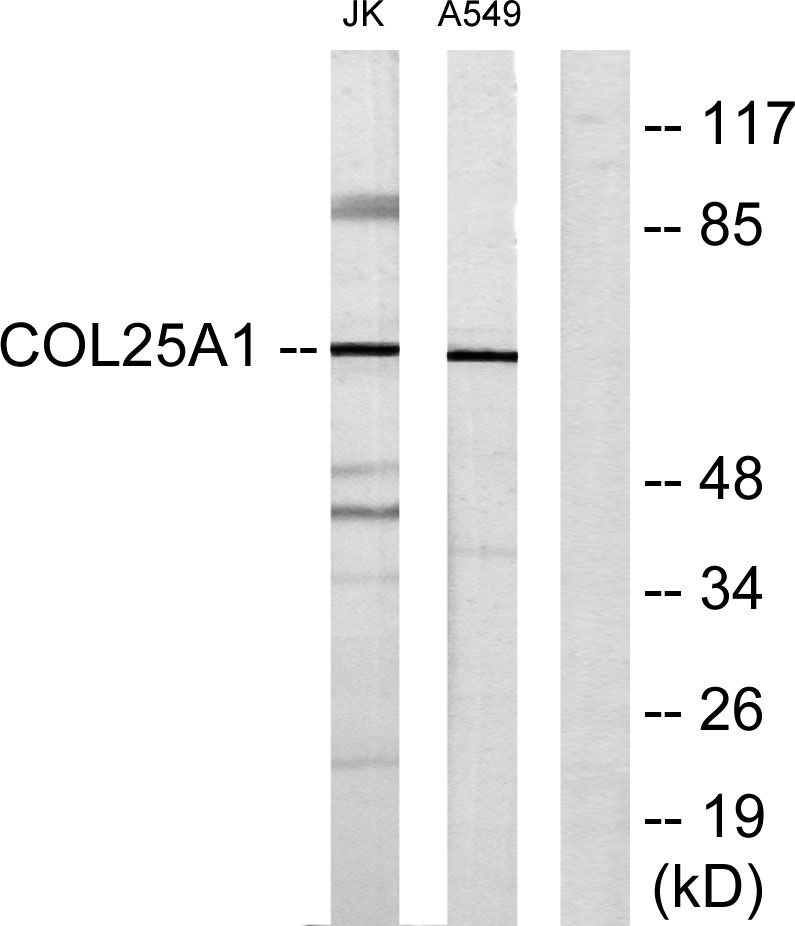COL25A1 Polyclonal Antibody
- Catalog No.:YT1021
- Applications:WB;IHC;IF;ELISA
- Reactivity:Human;Mouse
- Target:
- COL25A1
- Fields:
- >>Protein digestion and absorption
- Gene Name:
- COL25A1
- Protein Name:
- Collagen alpha-1(XXV) chain
- Human Gene Id:
- 84570
- Human Swiss Prot No:
- Q9BXS0
- Mouse Gene Id:
- 77018
- Mouse Swiss Prot No:
- Q99MQ5
- Immunogen:
- The antiserum was produced against synthesized peptide derived from human Collagen XXV alpha1. AA range:101-150
- Specificity:
- COL25A1 Polyclonal Antibody detects endogenous levels of COL25A1 protein.
- Formulation:
- Liquid in PBS containing 50% glycerol, 0.5% BSA and 0.02% sodium azide.
- Source:
- Polyclonal, Rabbit,IgG
- Dilution:
- WB 1:500 - 1:2000. IHC 1:100 - 1:300. IF 1:200 - 1:1000. ELISA: 1:20000. Not yet tested in other applications.
- Purification:
- The antibody was affinity-purified from rabbit antiserum by affinity-chromatography using epitope-specific immunogen.
- Concentration:
- 1 mg/ml
- Storage Stability:
- -15°C to -25°C/1 year(Do not lower than -25°C)
- Other Name:
- COL25A1;Collagen alpha-1(XXV) chain;Alzheimer disease amyloid-associated protein;AMY;CLAC-P
- Observed Band(KD):
- 64kD
- Background:
- This gene encodes a brain-specific membrane associated collagen. A product of proteolytic processing of the encoded protein, CLAC (collagenous Alzheimer amyloid plaque component), binds to amyloid beta-peptides found in Alzheimer amyloid plaques but CLAC inhibits rather than facilitates amyloid fibril elongation (PMID: 16300410). A study of over-expression of this collagen in mice, however, found changes in pathology and behavior suggesting that the encoded protein may promote amyloid plaque formation (PMID: 19548013). Multiple transcript variants encoding different isoforms have been found for this gene. [provided by RefSeq, Dec 2011],
- Function:
- caution:The pyrrolidone carboxylic acid reported in PubMed:11927537 probably formed artifactually from Glu-113 during the extraction procedure in 70% formic acid. In PubMed:15522881, the protein was found to have unblocked Glu at the N-terminus.,function:Inhibits fibrillization of beta amyloid peptide during the elongation phase. Has also been shown to assemble amyloid fibrils into protease-resistant aggregates. Binds heparin.,PTM:Glycosylated.,PTM:Hydroxylated on 11% of proline residues and 49% of lysine residues.,PTM:Undergoes proteolytic cleavage by furin protease to yield the soluble collagen-like Alzheimer amyloid plaque component.,similarity:Contains 7 collagen-like domains.,subcellular location:After proteolytic cleavage, CLAC is secreted.,subunit:Forms homodimers and homotrimers. Binds to the fibrillized forms of beta amyloid peptide 40 (beta-APP40) and beta amyloid peptide 42 (b
- Subcellular Location:
- Membrane ; Single-pass type II membrane protein . After proteolytic cleavage, CLAC is secreted.
- Expression:
- Expressed predominantly in brain. Deposited preferentially in primitive or neuritic amyloid plaques which are typical of Alzheimer disease.
- June 19-2018
- WESTERN IMMUNOBLOTTING PROTOCOL
- June 19-2018
- IMMUNOHISTOCHEMISTRY-PARAFFIN PROTOCOL
- June 19-2018
- IMMUNOFLUORESCENCE PROTOCOL
- September 08-2020
- FLOW-CYTOMEYRT-PROTOCOL
- May 20-2022
- Cell-Based ELISA│解您多样本WB检测之困扰
- July 13-2018
- CELL-BASED-ELISA-PROTOCOL-FOR-ACETYL-PROTEIN
- July 13-2018
- CELL-BASED-ELISA-PROTOCOL-FOR-PHOSPHO-PROTEIN
- July 13-2018
- Antibody-FAQs
- Products Images

- Western blot analysis of lysates from Jurkat and A549 cells, using Collagen XXV alpha1 Antibody. The lane on the right is blocked with the synthesized peptide.



